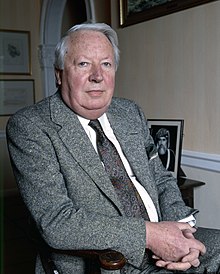Premiership of Edward Heath
|
The Right Honourable Sir Edward Heath KG MBE |
|
|---|---|

Heath in 1987 by Allan Warren
|
|
| Prime Minister of the United Kingdom | |
|
In office 19 June 1970 – 4 March 1974 |
|
| Monarch | Elizabeth II |
| Preceded by | Harold Wilson |
| Succeeded by | Harold Wilson |
| Leader of the Opposition | |
|
In office 4 March 1974 – 11 February 1975 |
|
| Monarch | Elizabeth II |
| Prime Minister | Harold Wilson |
| Preceded by | Harold Wilson |
| Succeeded by | Margaret Thatcher |
|
In office 28 July 1965 – 19 June 1970 |
|
| Monarch | Elizabeth II |
| Prime Minister | Harold Wilson |
| Preceded by | Sir Alec Douglas-Home |
| Succeeded by | Harold Wilson |
| Leader of the Conservative Party | |
|
In office 28 July 1965 – 11 February 1975 |
|
| Preceded by | Sir Alec Douglas-Home |
| Succeeded by | Margaret Thatcher |
| Shadow Chancellor of the Exchequer | |
|
In office 27 October 1964 – 27 July 1965 |
|
| Leader | Sir Alec Douglas-Home |
| Preceded by | Reginald Maudling |
| Succeeded by | Iain Macleod |
| President of the Board of Trade | |
|
In office 20 October 1963 – 16 October 1964 |
|
| Prime Minister | Sir Alec Douglas-Home |
| Preceded by | Fred Erroll |
| Succeeded by | Douglas Jay |
| Secretary of State for Industry, Trade and Regional Development | |
|
In office 20 October 1963 – 16 October 1964 |
|
| Prime Minister | Sir Alec Douglas-Home |
| Preceded by | Position created |
| Succeeded by | Position abolished |
| Lord Privy Seal | |
|
In office 14 February 1960 – 18 October 1963 |
|
| Prime Minister | Harold Macmillan |
| Preceded by | The Viscount Hailsham |
| Succeeded by | Selwyn Lloyd |
| Minister of Labour | |
|
In office 14 October 1959 – 27 July 1960 |
|
| Prime Minister | Harold Macmillan |
| Preceded by | Iain Macleod |
| Succeeded by | John Hare |
|
Parliamentary Secretary to the Treasury Government Chief Whip in the House of Commons |
|
|
In office 7 April 1955 – 14 June 1959 |
|
| Prime Minister |
|
| Preceded by | Patrick Buchan-Hepburn |
| Succeeded by | Martin Redmayne |
| Father of the House | |
|
In office 9 April 1992 – 7 June 2001 |
|
| Preceded by | Bernard Braine |
| Succeeded by | Tam Dalyell |
|
Member of Parliament for Old Bexley and Sidcup Sidcup (1974–1983) Bexley (1950–1974) |
|
|
In office 23 February 1950 – 7 June 2001 |
|
| Preceded by | Ashley Bramall |
| Succeeded by | Derek Conway |
| Personal details | |
| Born |
Edward Richard George Heath 9 July 1916 Broadstairs, Kent, England |
| Died | 17 July 2005 (aged 89) Salisbury, Wiltshire, England |
| Resting place | Salisbury Cathedral |
| Nationality | British |
| Political party | Conservative |
| Parents |
|
| Alma mater | Balliol College, Oxford |
| Profession | |
| Signature |  |
| Military career | |
| Allegiance |
|
| Service/ |
|
| Rank | Lieutenant Colonel |
| Service number | 179215 |
| Unit | |
| Battles/wars | World War II |
| Awards |
|
Sir Edward Richard George Heath KG MBE (9 July 1916 – 17 July 2005), often known as Ted Heath, was a British politician who served as Prime Minister of the United Kingdom from 1970 to 1974 and Leader of the Conservative Party from 1965 to 1975. He was a strong supporter of the European Communities (EC), and after winning the decisive vote in the House of Commons by 336 to 244, he led the negotiations that culminated in Britain's entry into the EC on 1 January 1973. It was, says biographer John Campbell, "Heath's finest hour". Although he planned to be an innovator as Prime Minister, his government foundered on economic difficulties, including high inflation and major strikes. He became an embittered opponent of Margaret Thatcher, who supplanted him as party leader in 1975.
Heath's lower middle-class origins were quite unusual for a Conservative Party leader. He was a leader in student politics at Oxford University and served as an officer in the Royal Artillery during the Second World War. He worked briefly in the Civil Service, but resigned in order to stand for Parliament, and was elected for Bexley in the 1950 general election. He was the Chief Whip from 1955 to 1959. Having entered the Cabinet as Minister of Labour in 1959, he was promoted to Lord Privy Seal and later became President of the Board of Trade. Heath was elected leader of the Conservative Party in 1965; he retained that position despite losing the 1966 general election.
...
Wikipedia
